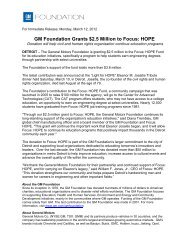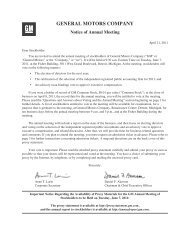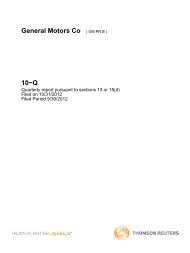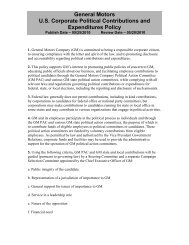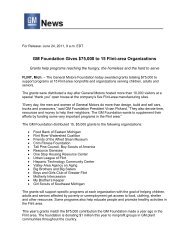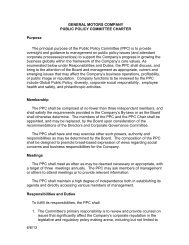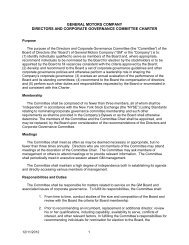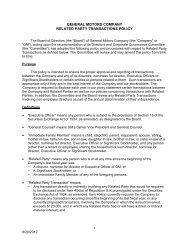Winning with Integrity (code of ethics) - General Motors
Winning with Integrity (code of ethics) - General Motors
Winning with Integrity (code of ethics) - General Motors
Create successful ePaper yourself
Turn your PDF publications into a flip-book with our unique Google optimized e-Paper software.
Export Compliance<br />
<strong>General</strong><br />
August 2, 2011<br />
<strong>Winning</strong> With <strong>Integrity</strong><br />
Several U.S. laws and regulations govern how we conduct certain transactions <strong>with</strong> foreign countries and specific parties.<br />
These laws apply not only to U.S. operations, but also to U.S. persons, wherever located, and products manufactured<br />
around the world using U.S. -origin parts or technology. Other countries have similar laws.<br />
Export Controls<br />
The law requires an export license before certain categories <strong>of</strong> products or data can be exported or re-exported. “Export”<br />
means not only shipping an item outside the country, but also sharing data <strong>with</strong> a foreign person inside the country.<br />
Examples <strong>of</strong> products requiring export licenses are numerically controlled machines, night vision equipment, computers,<br />
military products, s<strong>of</strong>tware, and related technical data.<br />
If you have knowledge, or even suspicion, that a transaction may involve a violation <strong>of</strong> export regulations, immediately<br />
report it to the GM Office <strong>of</strong> Export Compliance or your business unit Export Compliance Officer. Be alert to a “red flag”<br />
indicating that a transaction may not be what it seems. For example, the product’s characteristics may not fit the buyer’s<br />
business, or the buyer may be reluctant to <strong>of</strong>fer information about the product’s intended end use. When in doubt, don’t<br />
enter into the transaction.<br />
Foreign Asset Controls<br />
Foreign asset controls are economic sanctions or embargoes the U.S. places on certain countries or groups to motivate<br />
them to change certain practices. These controls apply to U.S. citizens, residents and companies, and sometimes to<br />
international subsidiaries <strong>of</strong> U.S. companies. The rules vary, but they tend to be broad.<br />
Employees must get guidance from the GM Office <strong>of</strong> Export Compliance before dealing <strong>with</strong> a sanctioned country or<br />
entity. Currently, the U.S. has imposed broad based sanctions against Cuba, Iran, North Korea, Sudan and Syria. A<br />
complete list <strong>of</strong> sanctioned countries and entities can be found at GM Office <strong>of</strong> Export Compliance under Embargoed<br />
Countries.<br />
Anti-boycott Regulations<br />
U.S. anti-boycott laws and regulations prohibit participating in foreign boycotts that are unsanctioned by the United<br />
States. These regulations apply to U.S. companies, their domestic and foreign controlled subsidiaries, and U.S. persons.<br />
Prohibited acts include refusing to do business <strong>with</strong> a boycotted country or <strong>with</strong> a company in a boycotted country, or<br />
requiring anyone else to refuse to do business at the request <strong>of</strong> a boycotting country. They also prohibit supplying<br />
information about the religion, sex, or nationality <strong>of</strong> an employee or supplier, or doing anything that would support an<br />
unsanctioned boycott <strong>of</strong> a country friendly to the United States.<br />
If you receive any request to take any <strong>of</strong> these actions, contact the GM Office <strong>of</strong> Export Compliance immediately.<br />
Additional information on anti-boycott regulations can be found at Antiboycott Regulations<br />
Examples<br />
18



